北师大版(2019)必修第二册Unit 6 The admirable Lesson 2 History Makers课件 (共22张PPT)
文档属性
| 名称 | 北师大版(2019)必修第二册Unit 6 The admirable Lesson 2 History Makers课件 (共22张PPT) |

|
|
| 格式 | pptx | ||
| 文件大小 | 2.1MB | ||
| 资源类型 | 教案 | ||
| 版本资源 | 北师大版(2019) | ||
| 科目 | 英语 | ||
| 更新时间 | 2023-11-29 17:41:55 | ||
图片预览

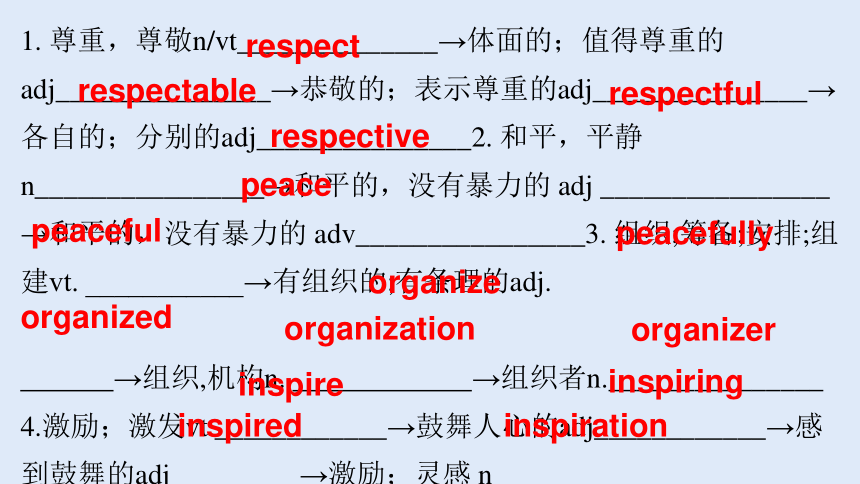
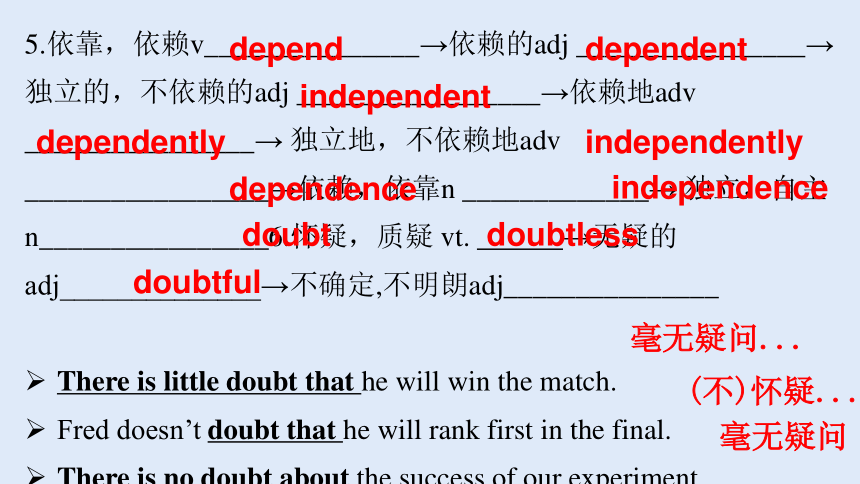
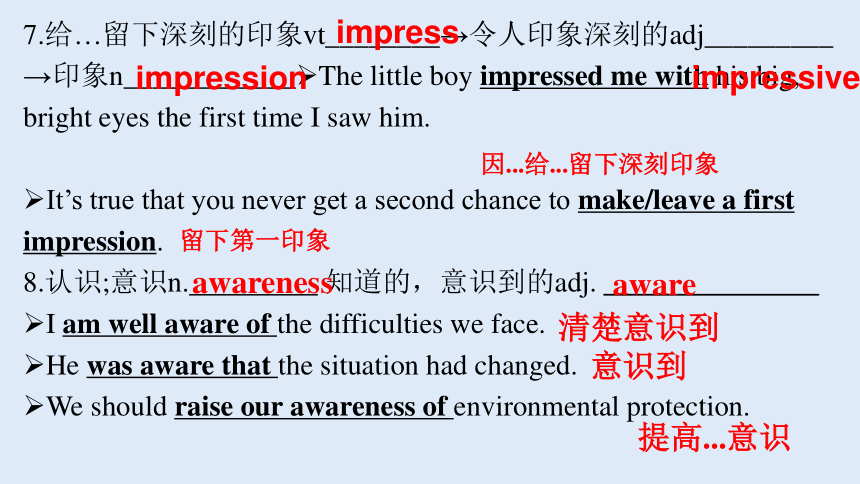
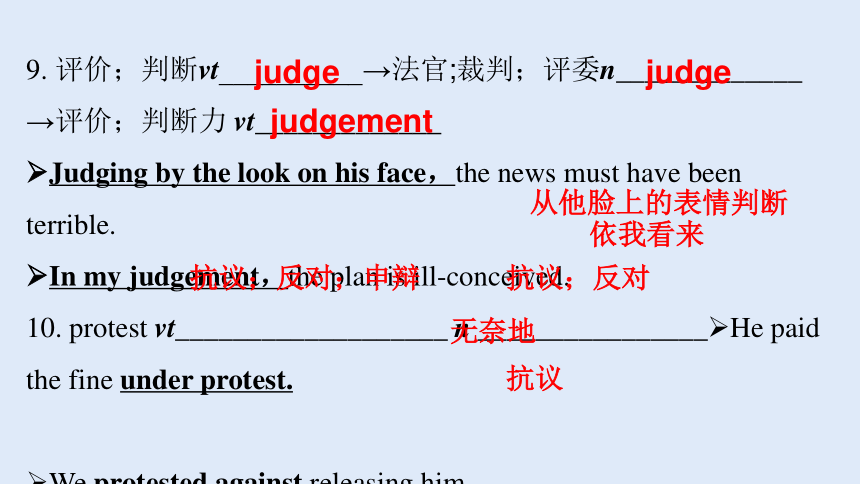
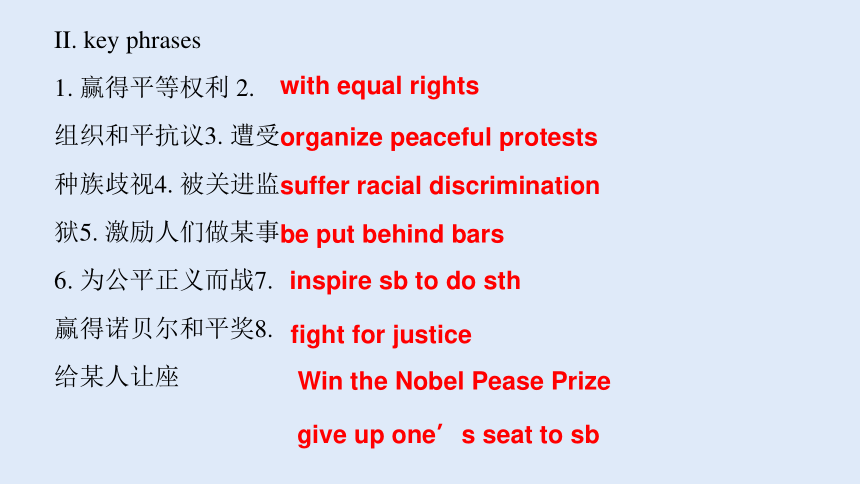
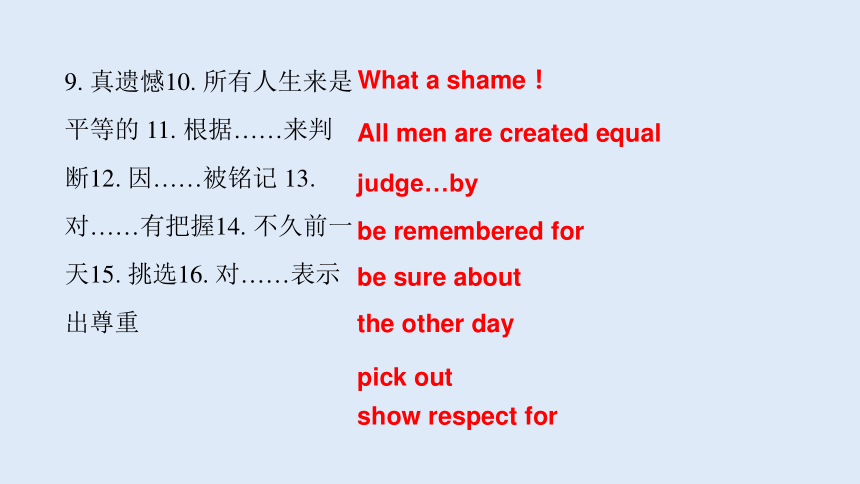
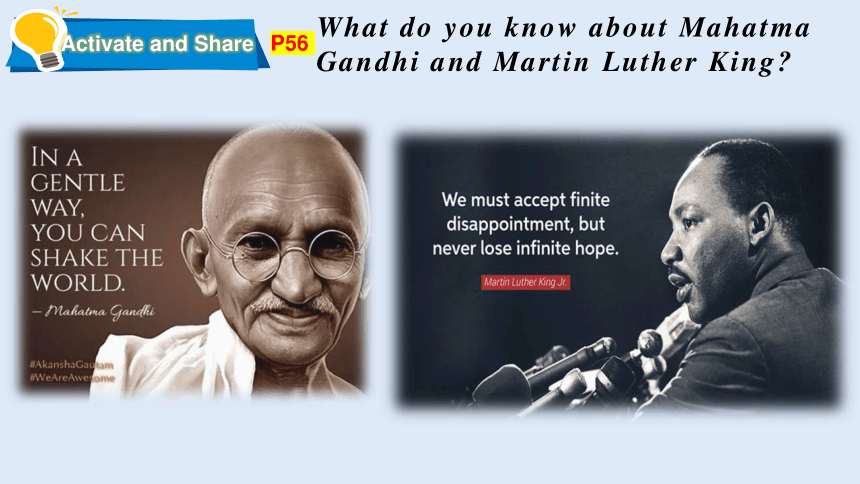
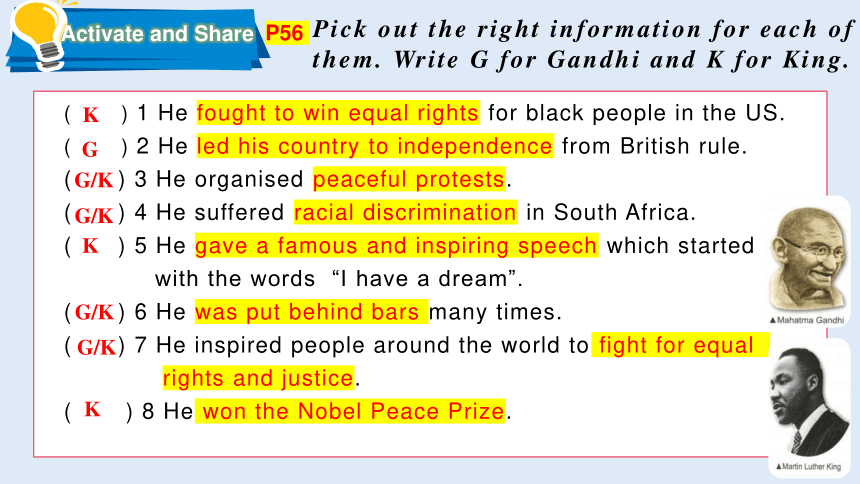
文档简介
(共22张PPT)
The admirable
Unit 6
Lesson 2
1. 尊重,尊敬n/vt______________→体面的;值得尊重的adj_______________→恭敬的;表示尊重的adj_______________→各自的;分别的adj_______________2. 和平,平静 n________________→和平的,没有暴力的 adj ________________ →和平的,没有暴力的 adv________________3. 组织;筹备;安排;组建vt. ___________→有组织的;有条理的adj.
→组织,机构n. →组织者n._______________ 4.激励;激发vt ____________→鼓舞人心的adj____________→感到鼓舞的adj_________→激励;灵感 n_____________
respect
respectable
respectful
respective
peace
peaceful
peacefully
inspire
inspiring
inspired
inspiration
organize
organization
organizer
organized
5.依靠,依赖v_______________→依赖的adj ________________→ 独立的,不依赖的adj _________________→依赖地adv ________________→ 独立地,不依赖地adv _________________→依赖,依靠n _____________→ 独立,自主n________________6.怀疑,质疑 vt. →无疑的adj______________→不确定,不明朗adj_______________
There is little doubt that he will win the match.
Fred doesn’t doubt that he will rank first in the final.
There is no doubt about the success of our experiment.
depend
dependent
independent
dependently
independently
dependence
independence
doubt
doubtless
doubtful
(不)怀疑...
毫无疑问...
毫无疑问
7.给…留下深刻的印象vt________→令人印象深刻的adj_________ →印象n____________ The little boy impressed me with his big, bright eyes the first time I saw him.
It’s true that you never get a second chance to make/leave a first impression.
8.认识;意识n. 知道的,意识到的adj. _______________
I am well aware of the difficulties we face. He was aware that the situation had changed. We should raise our awareness of environmental protection.
impress
impressive
impression
awareness
aware
清楚意识到
意识到
提高...意识
因...给...留下深刻印象
留下第一印象
9. 评价;判断vt__________→法官;裁判;评委n_____________ →评价;判断力 vt_____________
Judging by the look on his face,the news must have been terrible.
In my judgement,the plan is ill-conceived.
10. protest vt___________________ n ________________ He paid the fine under protest.
We protested against releasing him.
judge
judge
judgement
从他脸上的表情判断
依我看来
抗议;反对;申辩
抗议;反对
无奈地
抗议
with equal rights
organize peaceful protests
suffer racial discrimination
be put behind bars
inspire sb to do sth
fight for justice
Win the Nobel Pease Prize
give up one’s seat to sb
II. key phrases
1. 赢得平等权利 2. 组织和平抗议3. 遭受种族歧视4. 被关进监狱5. 激励人们做某事6. 为公平正义而战7. 赢得诺贝尔和平奖8. 给某人让座
What a shame!
All men are created equal
be sure about
the other day
judge…by
pick out
be remembered for
show respect for
9. 真遗憾10. 所有人生来是平等的 11. 根据……来判断12. 因……被铭记 13. 对……有把握14. 不久前一天15. 挑选16. 对……表示出尊重
What do you know about Mahatma Gandhi and Martin Luther King
Activate and Share
P56
Pick out the right information for each of
them. Write G for Gandhi and K for King.
Activate and Share
( ) 1 He fought to win equal rights for black people in the US.
( ) 2 He led his country to independence from British rule.
( ) 3 He organised peaceful protests.
( ) 4 He suffered racial discrimination in South Africa.
( ) 5 He gave a famous and inspiring speech which started
with the words “I have a dream”.
( ) 6 He was put behind bars many times.
( ) 7 He inspired people around the world to fight for equal
rights and justice.
( ) 8 He won the Nobel Peace Prize.
K
G
G/K
G/K
K
G/K
G/K
K
Activate and Share
P56
Understanding Sequencing
Sequencing is the order in which things happen.
When listening, pay attention to words related to order and sequence, e.g. first, after, the next year, later, in the end.
Make a note of any specific dates or time expressions, e.g. today, January, in 1955.
Skill Builder
P56
Read the sentences about Martin Luther King. Listen to the discussion and add the year for each event. Then order them. (Ex2)
a organised a march to Washington, D.C. ______
b organised a bus protest to help black people win the right to sit next to white people on buses. ______
c was killed ______
d had to give up his seat to two white people on a bus because he was black. ______
e received the Nobel Peace Prize. ______
He ①____ ②____ ③____ ④____ ⑤____
d
1963
1955
1968
1943
1964
b
a
e
c
Listen for Understanding
Listen for understanding P56
Listen again. Complete the answers to the questions about Martin Luther King. (Ex3)
1. What did he suffer He suffered ___________________.
2. What did he do He organised ___________________________
_______________________________________________________.
He helped black people ___________________________________
________.
3.What did he achieve
He received ____________________________________.
He inspired people around the world ___________________________________.
racial discrimination
a bus protest and many peaceful protests, a march to Washington D.C. and made a speech
win the right to sit next to white people on buses
the Nobel Peace Prize
to fight for equal rights and justice
(I = Interviewer R = Dr. Sam Roberts)
P106
Tapescripts
I: Hello. I’m sure everyone knows about Martin Luther King – a great man who fought to win equal rights for black people in the US. Today, we have Dr. Sam Roberts here to tell us more about him. So what was King like as a child
R: Well, he was a smart boy, but he suffered racial discrimination.
I: Racial discrimination
R: That’s when people were treated unfairly due to their skin colour. Here’s an example. In 1943, King took the bus with his black teacher. The white driver told them to give their seats to two white people.
R: King didn’t want to give up his seat. He believed that black people should be treated the same as white people. However, in the end, they had to do it.
I: Ah, what a shame! Did he do anything about this later
R: Yes. In 1955, King organised a bus protest, and asked all black people to stop taking buses. After some struggles, they won the right to sit next to white people on buses. This was King’s first victory.
I: Great! And King organised further protests in the 1960s, right
I: What What did he do then
I: Yes, that’s a really famous and inspiring speech! For example, “I have a dream that one day ... We hold these truths to be self-evident: that all men are created equal ... I have a dream that my four little children will one day live in a nation where they will not be judged by the colour of their skin but by the content of their character ...”
R: Very impressive indeed! The next year, King received the Nobel Peace Prize. But, unfortunately, he was killed a few years later in 1968. It was a great loss.
I: Indeed. King will always be remembered for doing a lot to help black people in the US. He has also inspired people around the world to fight for equal rights and justice.
R: Right. He organised many peaceful protests, but he was put behind bars many times for doing so. In 1963, he organised a march to Washington, D.C. and made a speech starting with the words “I have a dream”.
Talk about what Martin Luther King did in the following years.
Listen for Understanding
1943
1955
1963
1964
1968
He was asked to give his seat to white people on the bus.
He organised a bus protest and won the right for black people to sit next to white people.
He organised a march to Washington D.C. and gave a speech “I have a dream”.
He received the Nobel Peace Prize.
He was killed.
Focus on function
Listen again. Are they certain or uncertain How do you know (Ex6)
1. The girl is certain / uncertain that Gandhi was one of the most important figures of the 20th century.
2. The girl is certain / uncertain about the date of India’s independence.
3. The boy is certain / uncertain that Gandhi inspired Martin Luther King.
4. The girl is certain / uncertain that Gandhi inspired Martin Luther King.
5. The boy is certain / uncertain that Gandhi did not win the Nobel Peace Prize.
Focus on function
Listen and plete the Talk Builder. (Ex7)
Expressing Certainty and Uncertainty
Certainty
1. _________________ that he was one of the most important figures of the 20th century.
2. Yes, I __________.
3. Actually, I __________ Gandhi ever won a Nobel Peace Prize.
4. I am pretty ______ he didn’t.
Uncertainty
1. I ____________ about the exact date.
2. ______ Are you ______________
3. ____________ if that’s true...
4. _________ we should check a few other websites.
Talk Builder
There’s no doubt
’m certain
don’t think
sure
’m not sure
Really
sure about that
I don’t know
Perhaps
respect
independent
out
discrimination
protesting
judges
by
against
for
a
independence
peacefully
protesting
further
impressive
Judging
saw
to respect
marched
racial
The admirable
Unit 6
Lesson 2
1. 尊重,尊敬n/vt______________→体面的;值得尊重的adj_______________→恭敬的;表示尊重的adj_______________→各自的;分别的adj_______________2. 和平,平静 n________________→和平的,没有暴力的 adj ________________ →和平的,没有暴力的 adv________________3. 组织;筹备;安排;组建vt. ___________→有组织的;有条理的adj.
→组织,机构n. →组织者n._______________ 4.激励;激发vt ____________→鼓舞人心的adj____________→感到鼓舞的adj_________→激励;灵感 n_____________
respect
respectable
respectful
respective
peace
peaceful
peacefully
inspire
inspiring
inspired
inspiration
organize
organization
organizer
organized
5.依靠,依赖v_______________→依赖的adj ________________→ 独立的,不依赖的adj _________________→依赖地adv ________________→ 独立地,不依赖地adv _________________→依赖,依靠n _____________→ 独立,自主n________________6.怀疑,质疑 vt. →无疑的adj______________→不确定,不明朗adj_______________
There is little doubt that he will win the match.
Fred doesn’t doubt that he will rank first in the final.
There is no doubt about the success of our experiment.
depend
dependent
independent
dependently
independently
dependence
independence
doubt
doubtless
doubtful
(不)怀疑...
毫无疑问...
毫无疑问
7.给…留下深刻的印象vt________→令人印象深刻的adj_________ →印象n____________ The little boy impressed me with his big, bright eyes the first time I saw him.
It’s true that you never get a second chance to make/leave a first impression.
8.认识;意识n. 知道的,意识到的adj. _______________
I am well aware of the difficulties we face. He was aware that the situation had changed. We should raise our awareness of environmental protection.
impress
impressive
impression
awareness
aware
清楚意识到
意识到
提高...意识
因...给...留下深刻印象
留下第一印象
9. 评价;判断vt__________→法官;裁判;评委n_____________ →评价;判断力 vt_____________
Judging by the look on his face,the news must have been terrible.
In my judgement,the plan is ill-conceived.
10. protest vt___________________ n ________________ He paid the fine under protest.
We protested against releasing him.
judge
judge
judgement
从他脸上的表情判断
依我看来
抗议;反对;申辩
抗议;反对
无奈地
抗议
with equal rights
organize peaceful protests
suffer racial discrimination
be put behind bars
inspire sb to do sth
fight for justice
Win the Nobel Pease Prize
give up one’s seat to sb
II. key phrases
1. 赢得平等权利 2. 组织和平抗议3. 遭受种族歧视4. 被关进监狱5. 激励人们做某事6. 为公平正义而战7. 赢得诺贝尔和平奖8. 给某人让座
What a shame!
All men are created equal
be sure about
the other day
judge…by
pick out
be remembered for
show respect for
9. 真遗憾10. 所有人生来是平等的 11. 根据……来判断12. 因……被铭记 13. 对……有把握14. 不久前一天15. 挑选16. 对……表示出尊重
What do you know about Mahatma Gandhi and Martin Luther King
Activate and Share
P56
Pick out the right information for each of
them. Write G for Gandhi and K for King.
Activate and Share
( ) 1 He fought to win equal rights for black people in the US.
( ) 2 He led his country to independence from British rule.
( ) 3 He organised peaceful protests.
( ) 4 He suffered racial discrimination in South Africa.
( ) 5 He gave a famous and inspiring speech which started
with the words “I have a dream”.
( ) 6 He was put behind bars many times.
( ) 7 He inspired people around the world to fight for equal
rights and justice.
( ) 8 He won the Nobel Peace Prize.
K
G
G/K
G/K
K
G/K
G/K
K
Activate and Share
P56
Understanding Sequencing
Sequencing is the order in which things happen.
When listening, pay attention to words related to order and sequence, e.g. first, after, the next year, later, in the end.
Make a note of any specific dates or time expressions, e.g. today, January, in 1955.
Skill Builder
P56
Read the sentences about Martin Luther King. Listen to the discussion and add the year for each event. Then order them. (Ex2)
a organised a march to Washington, D.C. ______
b organised a bus protest to help black people win the right to sit next to white people on buses. ______
c was killed ______
d had to give up his seat to two white people on a bus because he was black. ______
e received the Nobel Peace Prize. ______
He ①____ ②____ ③____ ④____ ⑤____
d
1963
1955
1968
1943
1964
b
a
e
c
Listen for Understanding
Listen for understanding P56
Listen again. Complete the answers to the questions about Martin Luther King. (Ex3)
1. What did he suffer He suffered ___________________.
2. What did he do He organised ___________________________
_______________________________________________________.
He helped black people ___________________________________
________.
3.What did he achieve
He received ____________________________________.
He inspired people around the world ___________________________________.
racial discrimination
a bus protest and many peaceful protests, a march to Washington D.C. and made a speech
win the right to sit next to white people on buses
the Nobel Peace Prize
to fight for equal rights and justice
(I = Interviewer R = Dr. Sam Roberts)
P106
Tapescripts
I: Hello. I’m sure everyone knows about Martin Luther King – a great man who fought to win equal rights for black people in the US. Today, we have Dr. Sam Roberts here to tell us more about him. So what was King like as a child
R: Well, he was a smart boy, but he suffered racial discrimination.
I: Racial discrimination
R: That’s when people were treated unfairly due to their skin colour. Here’s an example. In 1943, King took the bus with his black teacher. The white driver told them to give their seats to two white people.
R: King didn’t want to give up his seat. He believed that black people should be treated the same as white people. However, in the end, they had to do it.
I: Ah, what a shame! Did he do anything about this later
R: Yes. In 1955, King organised a bus protest, and asked all black people to stop taking buses. After some struggles, they won the right to sit next to white people on buses. This was King’s first victory.
I: Great! And King organised further protests in the 1960s, right
I: What What did he do then
I: Yes, that’s a really famous and inspiring speech! For example, “I have a dream that one day ... We hold these truths to be self-evident: that all men are created equal ... I have a dream that my four little children will one day live in a nation where they will not be judged by the colour of their skin but by the content of their character ...”
R: Very impressive indeed! The next year, King received the Nobel Peace Prize. But, unfortunately, he was killed a few years later in 1968. It was a great loss.
I: Indeed. King will always be remembered for doing a lot to help black people in the US. He has also inspired people around the world to fight for equal rights and justice.
R: Right. He organised many peaceful protests, but he was put behind bars many times for doing so. In 1963, he organised a march to Washington, D.C. and made a speech starting with the words “I have a dream”.
Talk about what Martin Luther King did in the following years.
Listen for Understanding
1943
1955
1963
1964
1968
He was asked to give his seat to white people on the bus.
He organised a bus protest and won the right for black people to sit next to white people.
He organised a march to Washington D.C. and gave a speech “I have a dream”.
He received the Nobel Peace Prize.
He was killed.
Focus on function
Listen again. Are they certain or uncertain How do you know (Ex6)
1. The girl is certain / uncertain that Gandhi was one of the most important figures of the 20th century.
2. The girl is certain / uncertain about the date of India’s independence.
3. The boy is certain / uncertain that Gandhi inspired Martin Luther King.
4. The girl is certain / uncertain that Gandhi inspired Martin Luther King.
5. The boy is certain / uncertain that Gandhi did not win the Nobel Peace Prize.
Focus on function
Listen and plete the Talk Builder. (Ex7)
Expressing Certainty and Uncertainty
Certainty
1. _________________ that he was one of the most important figures of the 20th century.
2. Yes, I __________.
3. Actually, I __________ Gandhi ever won a Nobel Peace Prize.
4. I am pretty ______ he didn’t.
Uncertainty
1. I ____________ about the exact date.
2. ______ Are you ______________
3. ____________ if that’s true...
4. _________ we should check a few other websites.
Talk Builder
There’s no doubt
’m certain
don’t think
sure
’m not sure
Really
sure about that
I don’t know
Perhaps
respect
independent
out
discrimination
protesting
judges
by
against
for
a
independence
peacefully
protesting
further
impressive
Judging
saw
to respect
marched
racial
同课章节目录
- Unit 4 Information technology
- Lesson 1 Avatars
- Lesson 2 Apps
- Lesson 3 Internet and Friendships
- Unit 5 Humans and nature
- Lesson 1 A Sea Story
- Lesson 2 Professional Rescue Team
- Lesson 3 Race to the Pole
- Unit 6 The admirable
- Lesson 1 A Medical Pioneer
- Lesson 2 History Makers
- Lesson 3 The Superhero Behind Superman
